10 creative hotel concepts
and tips to craft your own
One of the most exciting parts of owning or developing a new hotel is coming up with the concept. Will it be a hybrid hotel in Paris with shared dorms and private rooms? Or maybe a glamping site in Banff with eco-friendly products and wellness activities?
Today, travelers have so many accommodation options to choose from that a new property can easily get lost in the crowd. To grab travelers’ attention, attract bookings, and generate buzz, hoteliers need to offer more than an exceptional guest experience, comfortable rooms, and warm hospitality. They also need a clever and original concept.
On season 3 of The Turndown, Richard Kessler, Founder of the Kessler Collection and a visionary in independent luxury, shared one of his most recent hotel concepts (which includes 2,000 original paintings and a 135-foot dinosaur in the lobby).
To get those creative juices flowing, here we share a selection of creative concepts from the hotel industry, along with tips for creating your own unique concept.
What is a hotel concept?
A hotel concept is a broad term describing a hotel’s look, feel, and experience. This includes:
- The setting. Where is it? Is it set in a verdant valley with sweeping mountain views or amid a bustling downtown surrounded by gleaming high-rises?
- The architecture. How big is the building and its grounds, and what is the architectural style? Is it a converted farmhouse in remote grasslands or a sleek modern structure squeezed into a compact city lot?
- Interior design. What does the hotel design look like? Does it have a modern and minimalist or historic and ornate visual identity? What materials, textures, and patterns are used in hotel spaces?
- Ambiance. What is the atmosphere like inside? Does it have a clubby ambiance with loud techno music or a Zen-like ambiance with a signature earthy scent?
- Guestrooms. How big are the rooms, and how are they furnished? Do they feature all the latest tech gadgets, or are they free of wifi and technology to encourage guests to take a digital detox?
- Service style. What should guest expectations be of service? Is it a limited or self-service property, a full-service hotel, or something in between? Is the service style button-up, five-star or button-down informal?
- Facilities. Is there a check-in desk, concierge, room service, pool, spa, and function space, or is it a small property with minimal amenities? If there is a restaurant and bar, how do they complement the overall concept?
- Technology. Is technology at the forefront, or does it play a more discrete role? Are there robots operating the front desk, or is staff equipped with the latest technology to help conduct personalized service?
The importance of a well-defined concept
Whatever concept you choose, it’s essential to define it clearly so that it captures the imagination of travelers, gives them a sense of place, and makes them want to experience the property.
“A hotel concept goes beyond aesthetics and integrates all the constituent elements of hotel operation into a coherent and compelling whole,” according to the Hotel Concept Handbook by Creative Supply and Ecole hotelière de Lausanne. “Starting with its unique story, it defines what a hotel looks like, what services it offers, how it presents and markets itself, and how its staff interacts with guests.”
10 examples of innovative hotel concepts
At Cloudbeds, we’re proud to work with some of the most innovative independent hotels in the world. For inspiration, we’ve selected a few unique properties we work with to use as case studies, including remote luxury hotels and glamping venues to budget city hostels and student residences turned aparthotels.
Missing Hotel
Located 45 minutes from Austin, Texas, Missing Hotel has an appropriate tagline: “Find yourself here.” As part of the experience, the hotel doesn’t explicitly state where it’s located, saying that “getting here is part of the adventure (think…scavenger hunt!).”
The property offers a variety of “shelters” housed in geodesic domes and villas at elevations of over 1000 feet, giving guests the impression of floating in the treetops. Select shelters feature a glass roof for stargazing, and all shelters have a personal plunge pool and outdoor fire pit and grill. Activities include forest bathing, yoga, and riding on the tree swings.
What inspired the concept?
Stephen and Sam Hopkins, Owners of Missing Hotel, say, “Missing Hotel is our dream, the culmination of thousands of experiences fueled by a relentless pursuit of adventure, creativity, and growth. Now, we want others to reap the benefits of our discoveries. This is not merely a hotel, a stopover, a self-help course. It’s a reprieve. It’s a space to regroup, explore, create, process, breathe more easily, and feel genuinely looked after. It’s permission to go MISSING for a while, trusting that when you return home, you’ll be better for it.”
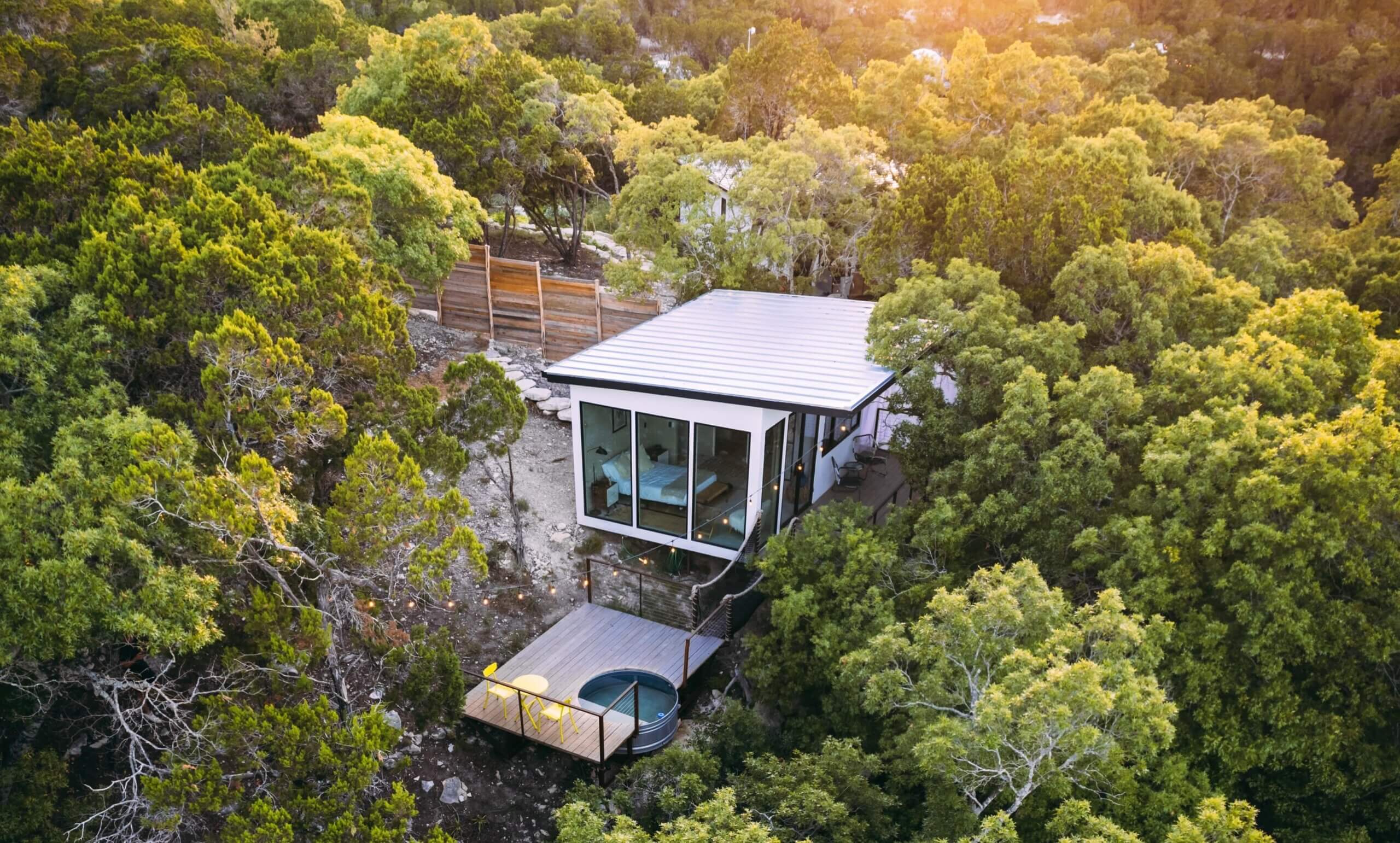
Alma Maya Resort
Alma Maya is a boutique hotel in Riviera Maya, Mexico, where travelers can fully disconnect from the hecticness of the world to reconnect with their inner self, guided through wellness activities. The property believes in maintaining the community footprint among its services and activities to boost the local economy while maintaining a high standard of customer service.
The resort’s accommodations are housed in a selection of “bubble rooms” and geodesic domes, where guests sleep under the stars in the heart of the jungle. Each room features air conditioning, Nespresso Machines, luxury beds, and a private terrace with a jacuzzi and resting net.
As one Google reviewer raves, “The air bubbles were a once-in-a-lifetime experience, and the geodesic domes made out of chukum were cozy and comfortable.”
What inspired the concept?
Sauveur, Antoine, and Alberto, the three managing partners at Alma Maya Resort, say, “from the very beginning, we loved the idea of an “oasis for the soul”. At Alma Maya, we want people to feel they are returning to their home, a boundary between the earthly and the divine. It is a place where you escape from your reality, returning to the sacred. It is an experience that awakens the soul, an experience of reconnection and healing we want to share with the world.”
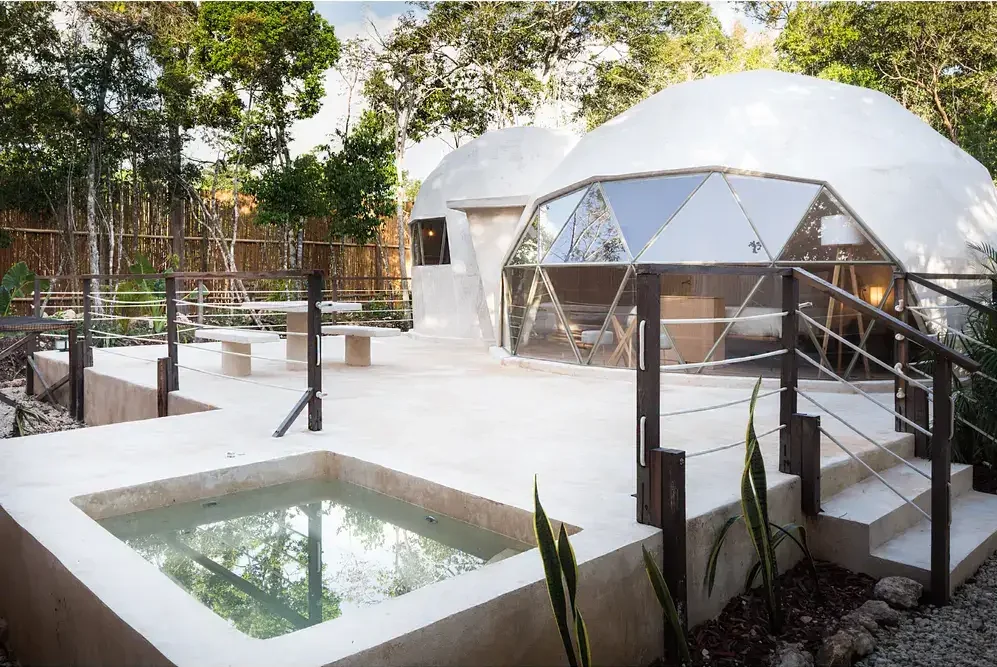
The Pad
Located in Silverthorne, Colorado, in the heart of ski country, The Pad has an innovative hybrid business model, creating a space where travelers can prioritize experience, adventure and focus their time on activities in the Rocky Mountains and the local community.
Built with recycled shipping containers, The Pad offers “an affordable, eco-friendly property that [has] the communal energy of a hostel infused with amenities associated with fancier digs,” reports The New York Times.
Guests can choose from shared hostel-style bunk rooms, micro rooms, or traditional private rooms and suites. The riverside rooftop hot tub is particularly popular with outdoor enthusiasts, and onsite happenings include open-mic nights and sound-healing therapy sessions.
What inspired the concept?
Lynne and Rob Baer, Co-founders of The Pad, say, “we wanted to bring our love of travel to Silverthorne and create a space that fostered that social style of travel. We pretty much took our favorite things from hotels and our favorite things from hostels and put them together.”
The ZERO Hotels (Box Lodge, Porto)
At ZERO Hotels in Portugal, hotel rooms are minimalistic wooden boxes inspired by Japanese capsule hotels, equipped with a private bathroom in a shared dorm room.
Here, guests are encouraged to “live outside the box.” At the company’s Porto property, every box comes with snorkel equipment for guests to enjoy in the rooftop plunge pool. As one Tripadvisor reviewer recently wrote, ZERO Hotels are “fantastically fun and quirky.”
What inspired the concept?
Bernardo Thierstein, General Manager at The ZERO Box Lodge Porto, says, “our idea and our mission was to find buildings with history that were pretty much empty, pick them up again, turn them into something different, and give it back to the community and the city.”
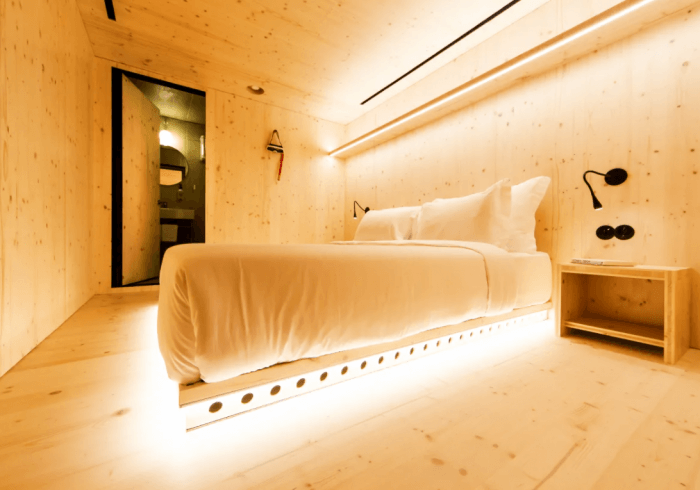
Read The Zero Hotel’s full story.
Matices Hotel de Barricas
If you’re a fan of tequila, you will love Matices Hotel de Barricas. In this hotel, located just outside Tequila, Mexico, guests stay in barrel-shaped rooms surrounded by an agave field on the site of a tequila factory.
With a mission to provide guests with new experiences related to Mexico’s national drink, the hotel offers tequila-based cocktails, tasting sessions, and guided tours of the factory and on-site museum.
What inspired the concept?
Susy Ayala, General Manager at Matices Hotel de Barricas, says this concept hotel “was built on a tequila factory in 2017, and its mission is for guests to have new experiences related to our national drink, tequila.”
Read Matices Hotel de Barricas’ full story.
Yugo
Yugo is one of the first global student housing operators, offering student residences across the USA, Europe, the Middle East, and Australia. During the school year, Yugo operates as traditional student accommodation, but in the summer months, it turns its spaces into apart-hotels to cater to the booming travel market.
Travelers that stay with Yugo during the summer get an experience far more luxurious than a typical hostel for a price lower than a standard hotel. Yugo’s spaces offer travelers their own private bedroom, bathroom, and access to amenities such as a fitness center, pool, and onsite restaurant in prime locations worldwide.
What inspired the concept?
Abby Bentley, Global Brand and Marketing Director at Yugo, says, “research conducted by Yugo highlighted the importance of universities and accommodation providers doing more to support student wellbeing. At Yugo, we live and breathe purpose, offering a truly differentiated living experience that is environmentally and socially conscious, emotionally supportive, and safe. We have a global property portfolio, with residences spread across 9 countries making us a unique brand in the world for higher education.
During peak summer seasons we identified a significant demand for accommodation, not only students wanting to travel but also tourists visiting the markets we operate in. We saw an opportunity to maximize the utilization of our spaces while our student residents were away during the summer months. By extending our offerings beyond the student community, we not only bridge seasonal gaps but also introduce a diverse range of guests to the comfort and convenient living experience of Yugo. While this is an innovative way to introduce new revenue streams to our business, it allows others to truly experience what Yugo offers.”
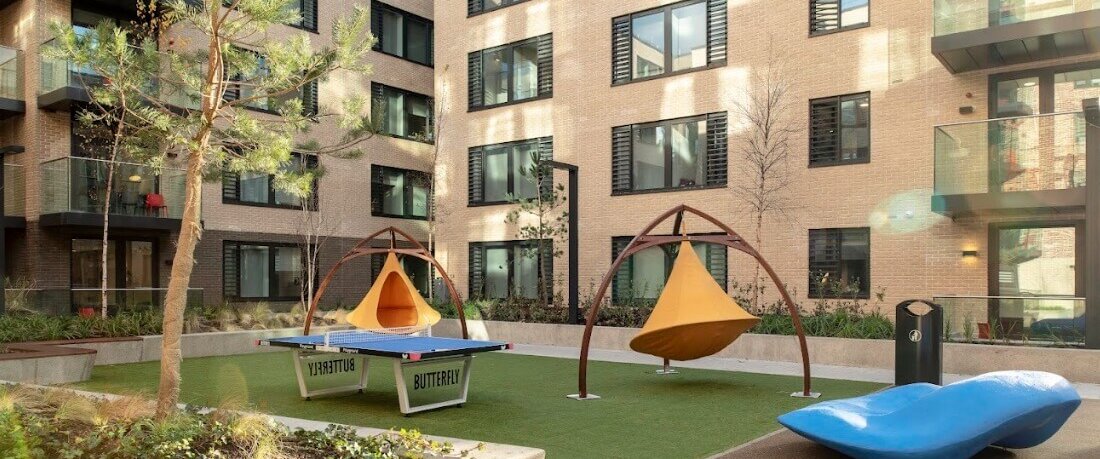
Casetta
With three properties in Southern California and more under development across the U.S., Casetta, which means “little house” or “lodge” in Italian, is a hotel group with a collection of architecturally significant and, in some cases, historic hotels.
Each of Casetta’s properties highlights the building’s history, honoring the past while designing for the future. They collaborate with local artists to design art-focused rooms and curated public spaces that speak to each property’s locale.
The concept is striking a chord with travelers. As one Tripadvisor reviewer wrote, the Palm Springs property is “so peaceful, so charming, so historic and authentic…I could get lost here for weeks at a time.”
What inspired the concept?
Caroline Schneider, Co-Founder of Casetta, says, “one of our pillars is finding locations that are very special and unique. That either means a building that is historic or has just been underutilized for a very long time or a community that is already thriving and incredible, but doesn’t have a really great hospitality offering.”
CoDE – THE CoURT
Housed in a former courthouse and jail in Edinburgh, Scotland, dating back to 1693, CoDE Pod Hostels – THE CoURT offers former holding cells as private rooms, a sleeping studio in the original courtroom, and pod bed dormitories.
The Asian-style pods are designed to make guests feel like they are staying in a private room, with curtains offering privacy and mood lighting providing ambiance.
The hostel also features a custom-built code entry system (which inspired its name), female-only dorms, and Scottish beer and whisky-tasting sessions in its underground vaults.
What inspired the concept?
Andrew Landsburgh, CEO of CoDE – The CoURT, says, “the inspiration for developing CoDE – The Court came from the incredible history we uncovered when researching the building and the location. It was fascinating that so many historical figures had either stayed or visited the building. At every stage, we have sought to celebrate the history with features like cell rooms and the whisky-tasting underground vaults. So many guests comment on what a unique place it is to stay.”
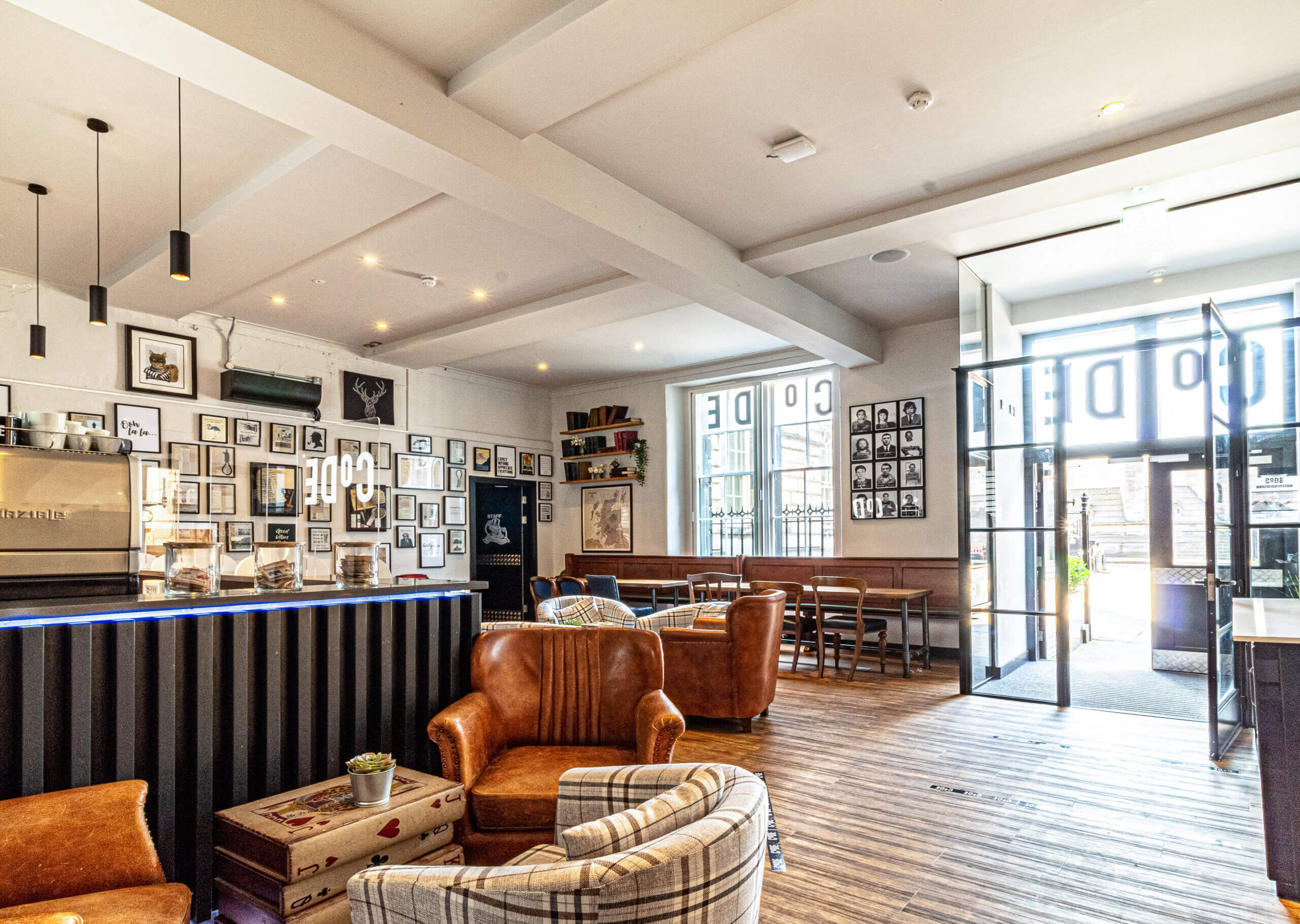
A-Lodge
A-Lodge is a hospitality group with properties in Boulder and Lyons Colorado. They’ve built their brand around three key pillars: Access, Adventure, and Amenities.
A-Lodge aims to give travelers access to the best outdoor adventures in the area. Their staff serves as “adventure concierges,” organizing activities like climbing, fishing, skiing, cycling, hiking, and taking in the town.
Accommodation choices range from campsites to a traveler’s hostel to a three-bedroom cabin. Properties also feature activities and amenities like a slackline park and beer garden.
What inspired the concept?
Asa Firestone, CEO and Co-Founder of A-Lodge and a passionate mountain climber, says, “the biggest aspect of meaning in what I do is providing easier access to the outdoors for our customers. I know how much the outdoors and adventure has done for me, and I want to give that to our guests.”
Listen to Asa on The Turndown.
Bogentrakt
Bogentrakt Hostel in Chur, Switzerland, was known as the “toughest prison in Switzerland” before it was transformed into its current concept: “a place of freedom, creativity, social exchange and above all a place where travelers meet locals and experience a stay in a lively neighborhood.”
The hostel welcomes people of all ages, offering micro rooms, family rooms, backpacker rooms, and a dormitory exclusively for female travelers. The Laundrette, located in the former prison’s laundry room, is a hybrid room that can be booked for a solo traveler or for up to six people.
What inspired the concept?
Marco Leibundgut, Founder of the Bogentrakt Hostel, says, “we spent three years rebuilding and renovating — we did all of the interior work ourselves, including the interior design, which was quite a challenge with the small prison cells. We like to say that we brought freedom back into this former prison.”
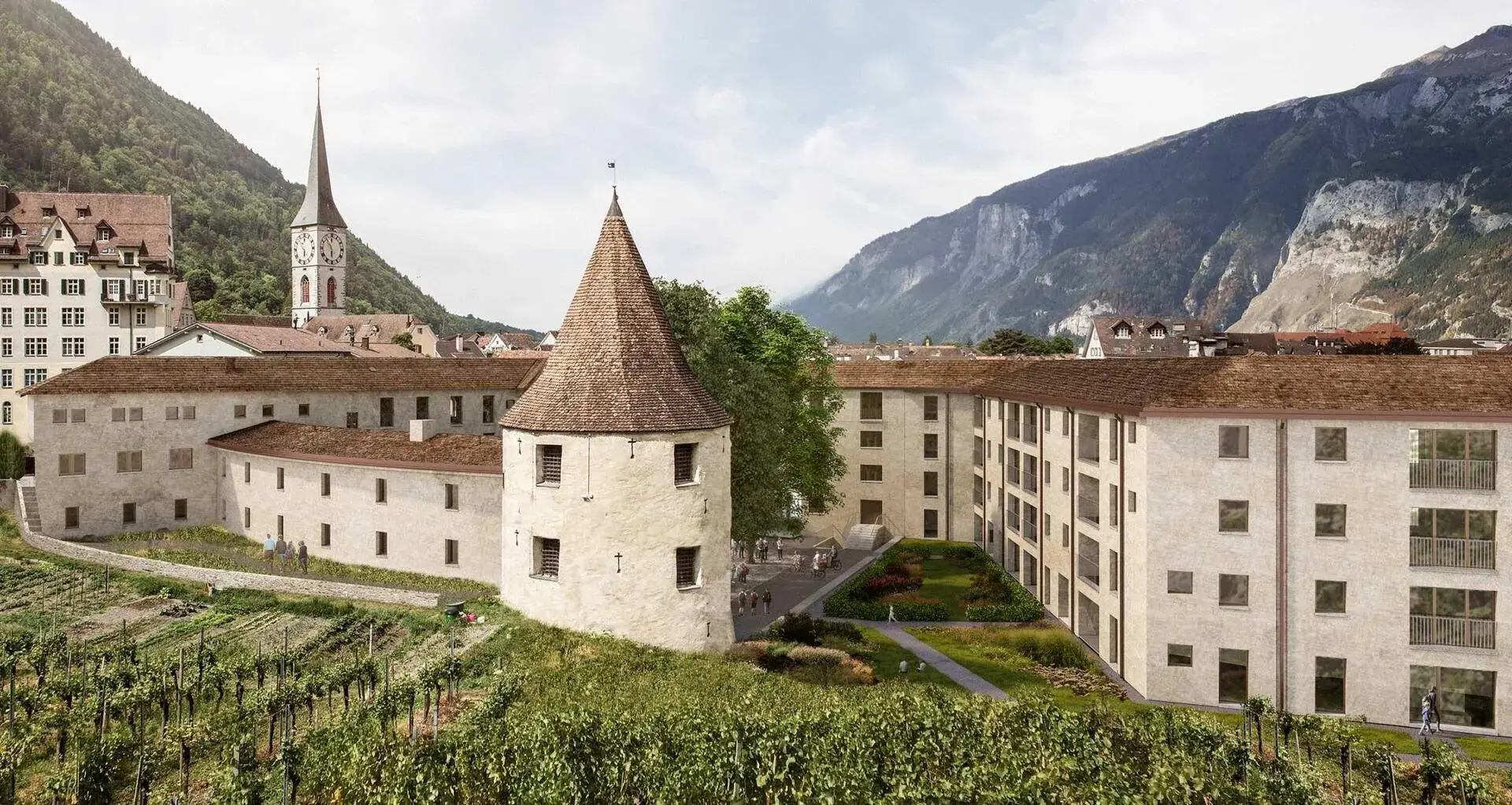
Tips for crafting an innovative concept
Clearly, the bar is high when it comes to creative hotel concepts in the hospitality industry. So, how can you design an innovative concept of your own? Here are some tips to consider.
1. Define your brand’s mission and vision
All of the properties listed above provide a clear mission or vision that makes them stand out from other properties. Whether you want to introduce travelers to nature and wellness in your region, give back to the local community, or promote sustainability, articulate your vision in a clear and compelling manner and use it as your operating mantra.
2. Determine your target audience and what’s important to them
Who will stay at your property? Why will they stay? By identifying key market segments and defining their lifestyles, preferences, booking behavior, and demographic information, you can develop targeted hotel marketing strategies that help bring the right guests to your door.
3. Incorporate the area’s history
Travelers love to learn about local history and culture. If your location has historical significance, incorporate it into your concept. This may require digging into archives and talking to locals. If guests are staying in a former monastery, for example, show them how to honor its history and traditions.
4. Do market research to find ways to stand out
Check out other lodging businesses in your area to find an original concept that isn’t already available. If there are a lot of chain hotels, for example, consider positioning the property as an independent boutique hotel. If lots of young people travel to the region, a hip hostel might be a good fit.
5. Think about ways to make your spaces multipurpose
Whether it’s offering a coworking space in your lobby or designing flexible rooms that can be sold independently or combined into a suite, the more versatile your living spaces are, the more revenue opportunities there will be.
6. Offer unique amenities and services that make a lasting impression
Often, it’s the little details and thoughtful touches that grab the attention of guests and make them want to share the experience with others. Whether it’s complimentary wine tastings, a selfie spot with a stunning backdrop, or beauty products in the minibar, these touches will help generate rave reviews, social media mentions, and travel media coverage.
7. Invest in the right technology to seamlessly execute your concept
The backbone of a successful hotel experience is technology. Whether your property is hi-tech or high-touch, you need to invest in tools to drive bookings, serve guests efficiently, and entice them back for future stays.



















